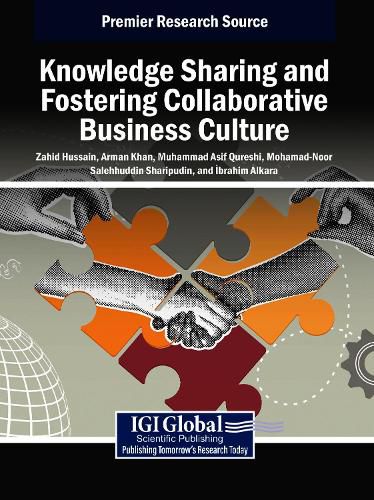Readings Newsletter
Become a Readings Member to make your shopping experience even easier.
Sign in or sign up for free!
You’re not far away from qualifying for FREE standard shipping within Australia
You’ve qualified for FREE standard shipping within Australia
The cart is loading…






This title is printed to order. This book may have been self-published. If so, we cannot guarantee the quality of the content. In the main most books will have gone through the editing process however some may not. We therefore suggest that you be aware of this before ordering this book. If in doubt check either the author or publisher’s details as we are unable to accept any returns unless they are faulty. Please contact us if you have any questions.
With the rise of technological advancement, organizations can leverage knowledge-sharing practices to foster both employee engagement and customer loyalty. New technologies enable organizations to create seamless, collaborative environments where information flows freely across all levels, breaking silos and boosting productivity. By facilitating access to critical knowledge, businesses can engage employees effectively, driving motivation and job satisfaction. Knowledge sharing also plays a critical role in enhancing customer relationships, building stronger, more loyal customer bases. Further research may demonstrate how leaders can foster a knowledge-sharing environment, ensuring that both internal teams and external customers benefit from the wealth of collective organizational knowledge. Knowledge Sharing and Fostering Collaborative Business Culture emphasizes the role of digital tools, such as AI, cloud-based platforms, and data analytics, in transforming traditional knowledge-sharing models. It examines how organizations can utilize AI and other digital tools to gather and analyze data, offering personalized solutions that align with customer needs and preferences. This book covers topics such as business collaboration, employee engagement, and workplace culture, and is a useful resource for business owners, sociologists, computer engineers, data scientists, academicians, and researchers.
$9.00 standard shipping within Australia
FREE standard shipping within Australia for orders over $100.00
Express & International shipping calculated at checkout
This title is printed to order. This book may have been self-published. If so, we cannot guarantee the quality of the content. In the main most books will have gone through the editing process however some may not. We therefore suggest that you be aware of this before ordering this book. If in doubt check either the author or publisher’s details as we are unable to accept any returns unless they are faulty. Please contact us if you have any questions.
With the rise of technological advancement, organizations can leverage knowledge-sharing practices to foster both employee engagement and customer loyalty. New technologies enable organizations to create seamless, collaborative environments where information flows freely across all levels, breaking silos and boosting productivity. By facilitating access to critical knowledge, businesses can engage employees effectively, driving motivation and job satisfaction. Knowledge sharing also plays a critical role in enhancing customer relationships, building stronger, more loyal customer bases. Further research may demonstrate how leaders can foster a knowledge-sharing environment, ensuring that both internal teams and external customers benefit from the wealth of collective organizational knowledge. Knowledge Sharing and Fostering Collaborative Business Culture emphasizes the role of digital tools, such as AI, cloud-based platforms, and data analytics, in transforming traditional knowledge-sharing models. It examines how organizations can utilize AI and other digital tools to gather and analyze data, offering personalized solutions that align with customer needs and preferences. This book covers topics such as business collaboration, employee engagement, and workplace culture, and is a useful resource for business owners, sociologists, computer engineers, data scientists, academicians, and researchers.